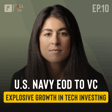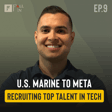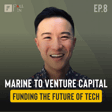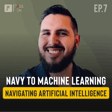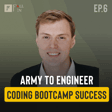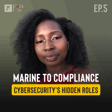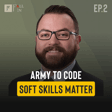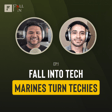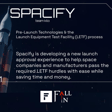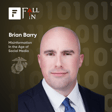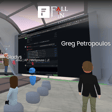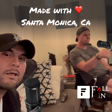Become a Creator today!Start creating today - Share your story with the world!
Start for free
00:00:00
00:00:01

Team EmotionTracking AI: Veterans Shine at Fall In Hackathon
Join us in this riveting episode as we converse with veteran trailblazers who clinched 2nd place in a metaverse hackathon, leveraging emotional tracking AI for mental health solutions. Discover how these Veterans adeptly merged AI innovation with their unique experiences to address critical mental health challenges. A must-listen for those passionate about the intersection of AI, emotional well-being, and veteran resilience. Dive in and be inspired!
Project repo: https://github.com/CStewCodes/LifeLine-Journal---Veterans-Mental-Health-Journal
Winners site: https://www.fallin.today/winners
Transcript
Project Lifeline Journal Overview
00:00:02
Speaker
All right. Welcome, everyone, to the Fall in Bets Hackathon podcast. I'm here with Team Echo.
00:00:10
Speaker
Lifeline Journal and very honored to have this team since they put a lot of heavy AI and deep work into this project. So excited to dive in and explore this project. So it would be great if we could do like a round robin introduction of each other and go over your military background and how you got into tech.
Veterans Transitioning to Tech
00:00:38
Speaker
So, Hill, you want to take this one?
00:00:40
Speaker
Yeah, absolutely, Jamil. So I just did four years in the Marine Corps. And as I was transitioning out, I attended a coding bootcamp, like the DOD Scalebridge program. And, you know, I worked with you as my mentor, and I came across the Hackathon, which was a great time. We were able to put together a full stack app to better veterans' mental health. Sweet. Chris Stewart, you want to go next?
00:01:10
Speaker
Yeah, sure. Okay. So yeah, my name is Chris Stewart. I'm a veteran of 10 years, active army. And I did medical laboratory technician work for five years. And then I did public affairs work for the last five and in my transition out of service.
00:01:30
Speaker
I did something similar to Suhail. I did a bootcamp with Galvanize. So it's in web development. So that was about four months. And I finished that in June of this year. And then that was, oh, actually the day that I graduated was like our first day doing the hackathon.
00:01:56
Speaker
Oh, cool. So I don't think you answered, how did you get into tech? Oh yeah. Sorry. Well, that was it. I mean, the, the, or what inspired you to get into tech rather.
00:02:10
Speaker
Oh, yeah. Well, I've always had an interest to make a few tiny apps and just didn't really know where to get started. I tried some other apps that you can learn to code on. And there's no structure or anything in those, really. Not something that keeps you accountable as the weeks go by. And so when I was transitioning out of the army, there is the DoD skill bridge program.
00:02:40
Speaker
So that's really what got me in. So yeah, that was really where the opportunity to apply the interest was through that program. Right on. Brandon, do you want to go next? I know you have a pretty rich background here. Yeah. So I joined the Air Force right after 9-11.
00:03:07
Speaker
And, uh, I had just come home from Japan and that is, it was a big thing for me. And, um, it's kind of topical at the moment because this is what's happening in the world right now as well. And, uh, after I got out of the military, I, uh, I joined a Zen Buddhist monastery and like began meditation and stuff like that.
00:03:37
Speaker
and got myself back into a place to where I
Hackathon Contributions and Inspirations
00:03:41
Speaker
could function in society again because I really had to find myself. And it's really hard when the world goes through times when shit hits the fan.
00:03:56
Speaker
And I wanted to find ways to help other people go through the things that I've gone through myself. And I think that each one of us has probably had issues to deal with, right? And yeah, after I left the Zen Buddhist Monasteries, I taught myself to program in the back of like an eight by 10 trailer.
00:04:24
Speaker
traveling around the country selling soap and dog beds and stuff like that at shows, and eventually became a technologist, like a coder and whatnot. And I was lucky enough to find Act Now Education on LinkedIn, which brought me to you guys, Fall In. And at Fall In,
00:04:53
Speaker
It was just an opportunity, right? It was, it was something that was, that was out there through the community that I had connected with. That was something I could choose to engage in. And I'm really, really thankful that I took that opportunity because I was in a bad spot when the hackathon came up and I was, I didn't know if we're going to do great or not.
00:05:23
Speaker
But it seemed fun and you guys put on a really awesome thing. And, uh, I, I enjoyed, I enjoyed my time doing it. But anyway, yeah, that's just a little story of, of my background and how I came to know fallen. Awesome. Chris, do you want to go next? I was in the Marine Corps for eight and a half years. I did kind of a. Raw.
00:05:52
Speaker
So I did technology slash logistics as a MAGTF planner there in the Marine Corps. I did it mostly as I go, as I go for college afterwards back in the day. So after Marine Corps, I went back to the university, got a bachelor of science in computer science, found my way into different kinds of IT jobs and kind of where I'm at now. And a lot of my job do nowadays doesn't do too much coding and I was
00:06:20
Speaker
Kind of like Brandon, I was looking into my network of different stuff going on and ways to kind of help out. And I saw the fallen event for Independence Day. And so I decided, hey, I love giving back and I miss coding and I miss kind of being with my people. So that's it. Cool. You didn't want to re-enlist back in the Marine Corps, do a B-billet? No, no, no. I tried to get out three times. I kept getting, uh,
00:06:49
Speaker
Reactivated so I said nope what college to my own thing. Okay Yeah, so hell you didn't read on this either right you could have could have gone drill instructor out I did not Jamil I Had a couple friends that did that pretty motivating So I want to bring it back to Brandon what sparked the idea for lifeline project or lifeline journal rather Yeah, so
00:07:18
Speaker
You put on a hackathon for veterans mental health. And I was going through my own voyage with overcoming suicidal ideation. And that was like something that was topical, right? So the mental health aspect of what you were doing and the journey that I was going through at that moment,
00:07:48
Speaker
They lined up and me being in technology, every single thing that I've done, whether it was building, I built a Bionic I, or I led a team that built the Bionic I. And like we did a team that hacked electric motorcycles and everything. It was always around things that were engaging for me and.
00:08:11
Speaker
The fallen hackathon happened at the same time as I'm working through my issues with that. And so I thought, well, Hey, I've got this thing that I'm doing. I wrote my own app to sort of help myself with it. How could we
Concept and Potential of Lifeline Journal
00:08:26
Speaker
maybe take this to the hackathon and.
00:08:31
Speaker
make something that can actually help other people out of it in accordance with the rules that were set forth. And so I pitched it to the team and everybody kind of liked the idea and we ended up trying to take the things that I had already built for myself to get me through my own journey
00:08:55
Speaker
to another level of adding the new technology that's out there today into it.
00:09:04
Speaker
I didn't really know how to do it. I don't think any of us had an idea of how we were going to do it. I remember thinking several times through the hackathon, what are we going to do? Because Suhail, he was in the middle of going through his coding boot camp at the time. And Chris was on transition out. You were in progress.
00:09:32
Speaker
I didn't know how we were going to do it, but we ended up finding all of our strengths as a team and putting things, putting it all together and just finding a way to utilize AI to actually solve a really big problem. Cool. So, and this is for everyone, whoever wants to take in, maybe all you guys maybe can take a part in answering, but
00:09:59
Speaker
what was the at a high level, you know, the idea of the project and, you know, how is it potentially useful to a veteran if you can paint that picture? I think, I mean, I think Brandon could answer that. I mean, I think all of us could. But I mean, really, though, because I mean, that really, it really proliferated from Brandon's idea, even, you know, kind of before he was stuff that he was working on before the
00:10:27
Speaker
Stuff that he was working on before the hackathon and then, damn, the hackathon with the whole idea of veterans' mental health, it just clicked so well. Brandon? Yeah. I think the way that this can help other people, it's got so many different ways that it can help other people.
00:10:50
Speaker
So we built, I like the fact that you called it emotional. What was the other thing that you guys call it? Emotional tracker AI or something like that, as well as the lifeline journal. Because the hackathon thing that we built was an implementation that was based off of my experience, but the thing that you
00:11:15
Speaker
pitched it as, Jamil, which is emotional tracking AI, is a really interesting thing because this can be applied to veterans all around the world, right? Or all throughout their journey, it can help in detecting their emotional state when they're
00:11:42
Speaker
writing journal entries at the VA or when they are even engaging in social media and things like that. It could be utilized as something greater than what we were thinking about it being utilized as in the hackathon.
00:12:01
Speaker
if it were, say, an open source thing, or a licenseable thing that other companies could integrate into their own technology, right? So if it was instead of the lifeline journal that we built, if it was the emotional tracker AI, like this core fundamental thing that could be plugged into other stuff, then it could be utilized anywhere in the mental health space that
00:12:28
Speaker
Detecting suicidal ideation and mental health track, emotional tracking could be useful. Go ahead, Chris. Sorry. Yeah, no worries. I just wanted to, I think we, I don't, I don't think we yet have described really what Lifeline Journal is yet. Am I right? Like what, what overall, like the idea of like what that was.
00:12:54
Speaker
So I think just to summarize what that is quickly, we built a functioning application, like a web application that is a journal entry that is to be used in conjunction with the VA. And it essentially has like two
00:13:20
Speaker
two main features. The first is to integrate AI recognition of what the journal entry says. So basically, it would detect any suicidal ideation within the journal entry.
00:13:43
Speaker
And then the second piece of that would then be to assuming that the user would agree to share their information with the VA, then that application would just send notifications over to the VA, the health care team that the patient is working with. And then it would also presumptively
00:14:12
Speaker
notify emergency services. Correct. So, and like Brandon is saying, I mean, of course, like, you know, this can be used outside of the VA, it can be used outside of veterans in general, but at the time when we were doing the hackathon, that is what we had focused on, is building an application that a patient would use to
00:14:39
Speaker
provide journal entries, and once it's submitted, then the AI would analyze it. Yeah. Tools like this would be really useful for patients that are going through IOP or various other mental health tracks with the VA. What's IOP?
00:14:57
Speaker
IOP is intensive outpatient, I think. Basically it's like therapy where it's a group thing where people talk to each other and you can have assignments and different things that you have to do that are related to your therapy sessions. And some of that can be journaling and that comes along with
00:15:24
Speaker
CBT, cognitive behavioral therapy. And when you tie what we had built and the research that Suhail and Chris did into the VA's mental health track, it's something that can be really useful and just like a super boost for the technology that's available today, Chris.
00:15:54
Speaker
I was gonna just kind of add in the fact that it wasn't just even getting the AI part to actually kind of work with everything was also there was a big intensive part of it where we're trying to make sure we were being as secure as possible and be as much on the actual device or wherever it is so that we were taking a
00:16:12
Speaker
you were you specifically kind of mentored that way in but the idea that making sure we try to keep it as secure and as sleek as possible so that when that does come or start working our way into that idea of being able to make sure it's secure for veterans or if it's a farther out reached idea that those elements are already in place. It's not a grandiose idea of
00:16:35
Speaker
And AI does something special for us. No, there are other elements that was put into
Team Roles and Dynamics
00:16:40
Speaker
it that all of the team had different elements to work on for it. Absolutely.
00:16:48
Speaker
So what were each of your contributions? And I'll start with Soheil. I mean, you're like starting this coding bootcamp or in the middle of it, jumping into this like team that's tinkering with AI. How did you how did you feel about that? And what was your contribution? Yeah, certainly, Jamil. Although I could do
00:17:10
Speaker
a hefty amount towards say the actual front end or back end. I was able to look into chat GPT and get some journal entries and mess around with it and find out maybe if we could get it to trigger that suicidal ideation alert. So that was the majority of my time spent on that.
00:17:37
Speaker
We were able to get past the initial hurdle of chat GPT, refusing to respond to that. And that was very helpful. So we were able to get a definitive yes or no towards whether something was likely to be suicidal ideation.
00:17:58
Speaker
I think something that you also added, Suhail, which was really, really awesome, was this big data dump of potential journal entries that someone could be writing as they were going through their therapies. You imagined yourself as someone who was in one of these therapy sessions, and you created Laura Mipsum, so to speak, journal entries for different emotional states. And Chris and I were doing research
00:18:26
Speaker
on papers that were written that people had done studies on classifying different mental health tracks or different mental health states. And like we gave that stuff to you to kind of like create this other stuff. And as we were integrating the prompts and the way that our code was talking with the AI,
00:18:55
Speaker
your input from that was like was really, really helpful because we wouldn't have been able to think about and figure out how are we going to write this stuff at the same time as like building up all of this data and research, like what somebody would actually be saying, you know.
00:19:15
Speaker
Oh, thank you, Brandon. So so hell, like, you know, coming off the heels of this hackathon, what? How do you envision yourself potentially putting in effort for a future hackathon? What do you see yourself doing differently since you've done one so far? Yes, certainly, Jamil. Coming in to the first one, I didn't have very much technical experience. But the guys that were able to introduce me to react and
00:19:44
Speaker
I got some more experience with that on the boot camp as I finished up the boot camp and I feel like I could definitely step in and offer some help now as a result of absolutely the hackathon pushing me in. Just diving into the cold water.
00:20:05
Speaker
Yeah, Chris Anderson, do you want to talk about your contributions and we can, we can go around Robin again. Sure. I was the old man of the group. So I had the research requirements. So I went and did a bunch of research. Had to take Brandon to hand me by the hand to kind of look through figuring out how to figure out how to get chat GPT to kind of work and kind of helped out with that project, part of the project and just kind of be the
00:20:32
Speaker
the old person in the corner like going that'd be good for presentations and let's make sure this wording goes right and this is how we should just kind of give an overall idea with some of the things that just kind of a UI kind of perspective of this is how they should be asked so I was just I was a I was the old man of the group so I just kind of helped out with those things since I was like I like programming but I'm not as not as up to beat as steward is and all that stuff so I loved that to them and I just helped out in my part
00:21:01
Speaker
I'd like to add to that and say that Chris was also very knowledgeable about the VA stuff, so it helped kind of bridge that for sure. I kind of know the way the VA kind of works internally in one different aspect, so it helped out where I could. Chris, do you want to go next? Yeah, sure. Brandon and I in part kind of tag team the project management and then
00:21:32
Speaker
I had a, like as far as like the development was, I did tag team the front end with, what's his name? Joshua, I wish he was here. Where is he? But yeah, Joshua, so Joshua made most of the front end. I am more or less like, I don't think he was too familiar with,
00:21:56
Speaker
the way that I set up React, I just set up the program, or I set up the environment, the development environment, like the project in GitHub, and then, you know, consolidated like all the information that we were all gathering into just some documents so that we were all kind of in line. And then, yeah, so. You're really humble, dude.
00:22:27
Speaker
I said, you're really humble. You pushed the whole thing along. I mean, Josh, Josh did a lot of the heavy lifting with like the coding stuff, but like you got everything lifted up and set up and structured so that like while you were like packing all your shit and getting ready.
00:22:47
Speaker
he could then take the ball and like do some real hardcore coding and then you would come back in like it was actually it was perfect the way you would shift gears from your regular life in the hack or back into the hackathon because
00:23:05
Speaker
you could come in and do the project management stuff. And then we could go in and do hardcore coding. And then you came in and did coding and setup stuff. And then it went back to your regular life. And then we got back into doing stuff. It was really cool. I was impressed with the handoffs that you had.
00:23:22
Speaker
Thank you. That's very kind. I kind of forgot that I was also packing my entire house, leaving the army in like four, three or four days. And it just left the yeah. Well, I don't remember. I mean, I do remember the leaving the boot camp.
00:23:42
Speaker
the same day, uh, that we started the hackathon. But, uh, yeah, lots of moving pieces. So, I mean, time's a ticket and we got, we got no time and we got tens, 10 projects and we just got to figure it out. So, you know, so if, if not, if not you, then who, right? Someone's got a, so anyway. Yeah. And then I think Brandon is the last one that hasn't gone yet.
00:24:11
Speaker
Yeah, so I just kind of came in, like thinking, well, I know a lot of code, and I built a lot of things. This will be cool. I've led a bunch of teams and stood back and took a look at who we had and assessed everybody's abilities and was like, I got an idea. And
00:24:37
Speaker
we sort of voted on everybody's idea. I think there were like two or three ideas initially.
00:24:43
Speaker
that we voted on. And then when we went with my idea, I took leadership of it and sort of took that initial assessment to sign roles to the people based off of their stuff and asked them if they thought it would line up with them. And when people agreed with that, they took the ball in their court and ran with their responsibilities. And that was something that was actually
00:25:08
Speaker
a breath of fresh air for me from working in the civilian sector of like everybody like debating things all the time and then actually being able to engage with veterans and work with people who knew how to get shit done. Quite frankly, it was like a massive weight lifted off my shoulders.
00:25:36
Speaker
It took this massive amount of stress that normally comes with getting technological idea running and made it way, way easier. And yeah, anyway, that's, that's a, I digress. Yeah. And that's kind of what I did. I just, you know, directed people came up with ideas and.
00:26:02
Speaker
I think probably one of my favorite parts was working with Chris on figuring out how we were going to get the chat GPT API to actually respond to our prompts correctly and like whittling down how we were engaging with it and the information that we were going to
00:26:27
Speaker
create for our, what do you call it, a backlog of tokens, basically the information that's stored for the AI to remember. It's short-term memory basically. And yeah, it was a ton of fun. I think at one point, because I'm super familiar with JavaScript and Chris is super familiar with Java, we just decided, hey, you know what, it's like,
00:26:56
Speaker
12 at night, we're both really tired. What if we asked chat GPT how to write this function? And we did. So we asked chat GPT how to write an algorithm, we described to it, and then took it and then modified it slightly for the information that we actually want to put into it. And we're like, holy crap, not only are we using AI to detect the things that we intended for it to detect for our goal, but we're also using it to write the solution
00:27:25
Speaker
that we're thinking up at the same time, which was kind of fun. It wasn't perfect, but it was a really fast way for kind of both of us being old guys to get something done really quickly and also think about it properly before doing it. So how
Features and Challenges of Lifeline Journal
00:27:51
Speaker
did you train the AI model to
00:27:54
Speaker
interpret and understand the entries in the journal. I think Chris would be pretty good to answer that one. I think we took a lot of the original research paper that I kind of found online, kind of figured out exactly how they were kind of they were querying
00:28:12
Speaker
chat GPT to kind of come up with the solutions, which was a couple thousand Reddit posts and stuff like that it was using. We kind of took how they put input and output and we adjusted it to kind of ask it a question in regards to making sure that we get an output we really wanted, which really was kind of simple that down into five different answers.
00:28:35
Speaker
And we just kind of figured out we had to kind of a simplified into what we don't want it a big long expression of exactly all these things that it got from this from the from the journal entry. We want to give it a one word answer. Is that is this depression? Is a suicidal? Is someone having a good day? Is this someone having someone's? I forgot what the fifth one was now.
00:28:59
Speaker
But we just we try to narrow it down to just being in one word. And then we just kind of use what Suhail did and kind of use some of his examples that we had. And we started putting those into into kind of just trying to teach that algorithm exactly what we wanted. We want the output to be and then exactly how to kind of categorize into those things and taking what we kind of learned from the previous part.
00:29:20
Speaker
That's about right. It was late at night, so. Yeah, yeah. It was late. And I think during part of it, I was like going to Costco to get a fan because we were going through a heat wave. That's right. And so, like, I was like, OK, I've got to go. I'll be back in 45 minutes. Here's like what we've come up with. You got to run with it while I'm going. And then I'm texting you while I'm in Costco.
00:29:47
Speaker
trying to assist as best as I could until I got back. And yeah, it was pretty cool. Yeah, so is there a particular feature that you guys are most proud of within the whole system? I think the coolest feature for me was
00:30:07
Speaker
when Josh was able to get the instant call happening, right? So once Henderson and I, Chris Henderson and I got the AI to properly give back the various emotional states when a proper suicidal ideation input from Suhail was given,
00:30:32
Speaker
the AI would be able to send a message through Stewart's setup in the repo or the code base to actually bring up an instant phone call
00:30:50
Speaker
in the web app for the veteran. And we made it so that you could not only have it instantly call, but you could also opt in. So it could just make the phone call for you, or it could bring up a dialogue box that had a button for you to press as soon as it was detected.
00:31:12
Speaker
The other thing that could happen in that process is an email could be triggered as the output of the function that was detecting this to let the mental health team know, hey, here's a veteran in crisis right now. You guys should review this stuff and like get on it. And the furtherance of that was that
00:31:40
Speaker
This idea of tracking the various mental health states could also become something that would be delivered to the mental health providers teams in progress as the veteran was interacting with this. And that was something that Henderson was like extremely, extremely helpful with.
00:32:04
Speaker
having that knowledge inside the VA as to what's going to happen and what various channels could this go through. And then for myself as well, the channels that I was going through in the VA, along with everybody else's experience and the tech and the processes that they were going through. Nice.
00:32:27
Speaker
I want to dive into the challenges that each of you guys have faced during the hackathon. I want to start with Sohail since it seems like you were the most junior in this team. Could you talk about some of your challenges when you first joined the team? Yeah, absolutely, Jamil. I believe Brandon brought up databases.
00:32:50
Speaker
relational databases and how this was related to that and it just all just went right over my head. I think Chris went over a beat with me on a bootstrap react and I think a bunch of the technical stuff was definitely something different for me being it was probably been like the first week or two of the bootcamp.
00:33:14
Speaker
I'm really happy that I was able to look through that because they got me a head start and pushed me further through the boot camp than I was currently at. Sweet. Chris, you want to go next? Stewart. Yeah. So I mean, okay. So just imagine, imagine you got
00:33:42
Speaker
You're already in a boot camp for four months. You're about to finish this thing. And then a friend tells you, or a peer in your cohort tells you, hey, there's this hackathon that's going on. It's the end of next week. It's actually when we graduate. I'm going to do it. You should do it too. And I'm like, OK, first of all, what is a hackathon?
00:34:09
Speaker
And so I had no clue at all, you know, what, uh, I didn't know that this was part of like the tech sphere at all. I had no concept that this was a thing. And so this was my first introduction to it. And, but.
00:34:30
Speaker
you know, we've been like, at least like in the cohort that I was involved in, like it's all kind of like, um, small team and small amount of time type projects that you're working on. So, uh,
00:34:50
Speaker
I felt more in my element when we were kind of you know, because because the the hackathon is like a 48 hour window of like straight like from from ideation of a application to coming up with some version of
00:35:14
Speaker
some working version. This is giving you one minimum viable product with one feature that works.
00:35:25
Speaker
And so from getting a project from literally nothing to the MVP, uh, just requires a lot of like, you know, people skills, like this, like trying to, trying to get all these ideas, you know, kind of like in the same kind of stratosphere. Right. So that, that, that was something that I've,
00:35:46
Speaker
love to be frank, but it certainly has its challenges. I don't know. That was it. The time, how much time that we had, which was literally 48 hours or less. Then just getting it off the ground, that was the big thing. It's really about
00:36:09
Speaker
Yeah, I don't know. All of that was, that was exciting, but that, that, I think that was like the big challenge for me was like, how are we going to make this happen? But we did. So here we are. Yeah. I think also it was super, super cool to see that.
00:36:32
Speaker
Like there were several times you and I were like, are we even going to get a project done? Right. Are we going to be able to deliver anything? And like, it wasn't until the very last bit that.
00:36:46
Speaker
we actually closed everything up and buttoned everything down. So we got a final product to show. And I think it was the last couple of hours where I was putting a presentation together. And we were in this, that's right, we were in this virtual world thing, this metaverse thing. And it was my first time in the metaverse. And so I had this little character standing up there.
00:37:14
Speaker
during a presentation and like practicing it in this room for a couple of hours at the very last minute. And it was a blast, man. It was a blast. And add my two cents to exactly what Brandon was saying. That was probably one of my biggest scares during all the whole event was A is I'm not, I'm the old man of the group. So
00:37:40
Speaker
the fact that it was like trying to get everything put together. And I remember like sitting on the initial couple calls, we began the 48 hours. It was like, oh, we've got a lot of ideas kind of going into this one. We got to kind of figure out what we wanted as the closing up. And I remember the morning of the presentation, there was a couple of times the bill wasn't quite working out right. And we were sitting going, we got to get this fixed. We got to get the presentation working. We're all going to figure out everybody else. Is everybody logging in to make sure it all working?
00:38:10
Speaker
I think that was one of my biggest fears, like, A, am I gonna be able to help out in a lot of this process? Am I gonna be able to keep up with everybody going on? Because I would also listen to Chris over there and their conversations about trying to figure out how to get the database and all that to work at the beginning of the whole thing to just trying to participate and have out wherever I could, so yeah. Yeah, kind of shifting away from the project a little bit and into the,
00:38:37
Speaker
the program of the hackathon where we had workshops and speakers. I'd love to hear more about your guys' experience with that, if you guys had any anecdotes with any of the speakers, if anyone stuck out more than the rest, or if you guys had anything to share related to the speakers or workshops. I know we kind of use some of the speakers and some of the sections like on
00:39:04
Speaker
there was a section on mental health and the providers that help out and making sure they kind of keep it the center of the idea. And we kind of included that into the project. We used kind of a lot of the speaker parts to make sure those kind of ten poles for the whole project itself. So I specifically remember the section with the making sure the mental health providers are always integrated. It's not a
00:39:29
Speaker
program goes off in its own little venture and does its own thing, you know, keep them involved. So that's what I remember. Yeah, Brandon, did you or what did you think of Ted Benson, our AI workshop that we did? Since you're, you know, super talented in that space, curious, curious to know if you even attended it or if you did.
00:39:53
Speaker
How you feel about it? Which one was Ted? Ted Benson. He's the founder of Steamship. He came in and did a workshop on how to build your own. Oh, yeah, that's right. I was actually taking notes during his presentation because he gave a ton of really great information.
00:40:12
Speaker
around the things that we could actually utilize. And so I took the chunks that I could imagine being useful for the idea that I was planning on pitching already to the team when I was listening to that. And I thought it was also interesting with the other people that were speaking as well, because each one of the people brought something to the table
00:40:38
Speaker
You had some speakers that were clearly going through something while they were speaking. And it was very enlightening for us to watch and witness and be able to be there during a mental health hackathon for that individual.
00:40:58
Speaker
while they were going through it and support them and identify with them at the same time as taking a break from the coding that we were doing and then integrate that into how we were building our stuff. And then there were other speakers as well that were in there that were really awesome.
00:41:21
Speaker
But I think Ted's stuff was really good because it got me personally thinking about the tools that were available for developers to utilize when they were building any kind of an AI project. And it sort of just got my gears turning as to how can we approach what we're doing? How can we achieve our goals for this hackathon, right? How can we win it was what I was thinking about.
00:41:53
Speaker
Jamil, can you remind me again, the, the speakers, because that was, I mean, now it's about a few months ago. So like that was probably for me, that was like the most interesting or the most memorable one for me because of the, uh, information in his speech, but I don't recall all of them off the top of my head.
00:42:20
Speaker
Yeah, so we had Michael Pet from Uber that came in on the third day. Obviously our keynote fireside chat with Jake Wood, who's the founder of Groundswell and formerly at Team Rubicon. We had a social media influencer, Shane McCree come in and talk about resilience. We had Chris Brown from the mental health side of things have a chat with Adriana.
00:42:51
Speaker
Yeah. What was the speed or what was discussed with Chris Brown? Cause I don't recall that one.
00:42:59
Speaker
Yeah, it was mostly diving into the subject of mental health since he's a mental health counselor. He's a Marine Corps veteran. And now he's a therapist at the VA. And so that one is right before Jake Wood came in. So yeah, brought up really good concerns. Yeah, I remember that
Future Plans and Collaborations
00:43:21
Speaker
he his primary concern was that that
00:43:26
Speaker
the healthcare system not to take away from the human aspect of the care by using AI in general and that was a concern that we had before he came up and that was something that
00:43:50
Speaker
we addressed as well within like when we talked about our ideas and what we decided on moving forward was that it was, we would build something that wouldn't necessarily feel like it's taking over a human's job of, I mean, or not necessarily human's job, but it wouldn't take away from the human interaction of a, you know,
00:44:22
Speaker
provider, licensed provider, and the patient. It would just be a tool that would supplement the care that the patient's getting. Which is a clear distinction. Yeah, that's all. It was just a very clear distinction between the two.
00:44:43
Speaker
That was one of the big things that you pushed, Stuart, while we were building it was to maintain that human interactive feel. We don't want to make this super, super techy because if we do, then some vets are going to be pushed back by it because there are some people who are like, oh, I don't want AI. I don't want a big brother looking at my thing. They get all off on one track.
00:45:08
Speaker
And we didn't want to go too far onto the opposite rails of being super tech integrated. And the other thing that you pushed through it was making sure that we weren't too intrusive, right? We had to, Henderson and I talked a lot about some of the ideas you brought up around people who wouldn't want their information to be sent out to either a third party AI source,
00:45:38
Speaker
or even their mental health care provider. So we had to think of ways as to how our system could be integrated so that it could be run on a cell phone. For the hackathon, we didn't get that portion done. But after the hackathon, I did some research with llama2 instead of chatgpt.
00:45:57
Speaker
And that can actually be run in a Linux terminal on the phone itself so that everything can be done on the device for a secure setup, so to speak. And anyway, I digress. The idea was to make it not too intrusive and also still feel human. And that was a really big thing that you pushed on the table, I thought.
00:46:23
Speaker
Yeah, I think, you know, like, it's just, I mean, someone mentioned this earlier, I can't remember when, but the idea is just like, just because you can make something doesn't mean you should make it, right? I mean, like, if you're gonna make something, make something that's useful, and like, you know, we know, you know, we're dealing with veterans, we're dealing with people who don't like oversight, right? And that's just, that's just, you know, about
00:46:53
Speaker
I mean, that's anybody. Nobody really wants to have their personal information out in the cloud or out in the web or wherever it is, where you don't know where it is. All of these are just... I guess this is kind of answering one of the other questions that you had about what are the...
00:47:15
Speaker
hurdles that we overcame in the process of making this was nailing down the focus of what we were producing because it felt much better collectively knowing that
00:47:35
Speaker
Or at least believing like everyone in the group seem to believe that this is something that truly could be useful instead of making something. Well, I mean, like we're just building it just because we're just trying to see if we can integrate chat GPT into this kind of like prompting system, uh, journaling system. Like, no, like, I mean, we're, we're building something that, I mean, has potential to truly be used in, in the healthcare system. So.
00:48:06
Speaker
Yeah. Yeah. Chris, so how do you guys have anything to add with any of the other speakers? I know when I did the post event survey, a lot of folks said good things about the Ubers, Michael Petts talk. And so, yeah. Do you guys have anything to add speaker wise? Yeah, absolutely. I like that you brought Shane on there. He really did highlight a lot of the
00:48:34
Speaker
hurdles of some transitioning service members. So I think that did align with what our app wants to accomplish. And I agree. I was thinking about the Uber conversation, the gentleman from Uber and all that stuff and that transitional part and just kind of that different perspective from a normal service member transitioning out and trying to get into that part of life and kind of things he's gone through and the
00:49:00
Speaker
just to kind of the roles of being kind of a tech company and all that. It kind of felt kind of personal in some way. I mean, my mind was a little bit maybe into our project at the time. So, but yeah.
00:49:13
Speaker
So thinking ahead in terms of like your plans with the project, are you guys looking at, you know, potential collaboration from, from other sources or potential partners? How are you guys seeing this move forward? Yeah, so I'll pick up the ball on this one. The initial place where we are right now, I've actually been accepted into a founders program.
00:49:44
Speaker
that can help teach us about how to get a startup going, right? And open the door for meeting people that could be leveraged or beneficial to us or mentoring us and getting this off the ground. At the same time as reaching out to some people that have input into some of
00:50:14
Speaker
the people who are really valuable or really connected for doing this. And they've said that we need to get doctors on board with a prototype of our app that can be tested, right? If we get expert approval or just expert feedback, really, it's not even approval, then it can move us to the next stage of potentially getting investment. And that's something that I'd really like to see being done. And Henderson and I have talked a couple of times about
00:50:44
Speaker
how to engage with the VA potentially on this and what the right channels would be. And I've also talked to my own psychiatrists and therapists and doctors about this sort of thing to find the right avenues of getting experts to actually give feedback that aren't going to be a conflict of interest with me or anybody on the team, right?
00:51:11
Speaker
And that's sort of the things that I have looked at in getting this to the next stage of continuation. Sweet, good luck. Have you guys explored similar products? Like I know Pi is kind of making headlines. Not sure if you guys heard of that app. There's character.ai, which I remember talking to you about this, Brandon.
00:51:42
Speaker
There's some other similar ones as well. But yeah, have you guys had an experience with similar products and notice any like major differentiators? Yeah, so I've got some experience with character.ai and a couple of the other different AI platforms. I've actually like, so I mentioned earlier that I studied at a Zen Buddhist monastery and I'm going through like some pretty extensive training with that stuff. I actually trained in AI on building
00:52:10
Speaker
like a Zenroshi and stuff like that or a Zenmonk. And it's really interesting how you can utilize the platforms that are out there to build like a chatbot or something like that that can do this.
00:52:24
Speaker
But the thing that was really cool from the hackathon that we did was we didn't just build something that would chat with someone. We built a piece of core functionality for any kind of code base that could be a tool and it could be plugged in. So detecting what mental health state someone was in in a way that could be used in code is way different than training a chatbot.
00:52:51
Speaker
that can just go back and forth with you and potentially be a therapist, maybe saying good things or maybe not being saying good things. And that was one of the things that Stewart brought up that we should probably not try to tackle in the two or three day hackathon that we had because it's a really dangerous thing. And you get on the verge of breaking that human connection sort of a thing there. And if it goes wrong,
00:53:17
Speaker
I think Henderson had brought up how dangerous that could be. And it's something that I had also experienced with my background in the bionic eye stuff with working with the FDA and the regulations that are around those things. It's a really, really fine line. So we managed to avoid that entirely by building something that gave just a chunk of answers, like an array out that could be utilized in any kind of application at all.
00:53:48
Speaker
And we built an app around it. Awesome. Yeah. As we were kind of wrapping things up here, how can, how can, you know, communities, you know, support the mission and growth? Is it adding more stars on GitHub? Is it, you know, or yeah, you guys tell me.
00:54:12
Speaker
I mean, you can just throw in ideas out there. The only reason we're talking to you right now is because you created Fallen and you had an opportunity for us to have a hackathon. Hackathons only give us two days, two, three days, I guess, of trying to work on this.
00:54:39
Speaker
So I mean, personally, I think I would like to see some more hackathons, maybe in the sense of episodes, I don't know, just stages. So this can be the first of four hackathons that we work on the same projects.
00:55:06
Speaker
And we try to develop it further and further and further. And then we move on to a different topic. I don't know. I know that it requires resources to make these things happen. I'm not taking away from that. But man, it was a good experience to continue to work within a team. So the opportunity to do that is really the foundation of getting this off the ground.
00:55:40
Speaker
That's what I would like to see if that's something that's possible. Yeah, I think building on what you're saying, Stuart, it would be really awesome if anybody could reach out to Jamil or anybody else that they know the contact information for on this podcast.
00:56:02
Speaker
if you wanted to help support us either through working with us or through potentially seed funding or something like that, as well as pairing with a little bit of mentorship as to how to move forward with it, I think that would be a really big benefit because for getting everybody's engagement in actual time, it does take something that
00:56:31
Speaker
is going to help us push through things, whether it's like getting pizzas or Red Bulls or, I don't know, paying the gas or whatever. Any little thing that can help with it is going to be an additional motivator for our team to continue building these things.
Reflections and Aspirations
00:56:50
Speaker
And the more motivation that we get,
00:56:52
Speaker
the harder we can push on it and the more we can show to the people who are looking to see things from us so that they can put real money into it right as i was saying earlier in the podcast we have people who are out there that actually wanna see like a production version of the doctors have.
00:57:16
Speaker
actually been able to give to patients to test. And we just got to get to that point. And right now we've got something that works fairly well, but it's not something that I think any of us really would feel comfortable putting in the hands of somebody who was where I was just a couple of months before the hackathon actually started. Because I don't even know how I put together the little app that I built
00:57:45
Speaker
so that I could be journaling during my CBT sessions and whatnot. And so to have something that works as well as that plus having the integration of the AI into it is really our first step to getting to a true round of investment. And I think we could use some help with that. Cool.
00:58:14
Speaker
I wanted to dive back into the project sort of workflow. Can you talk to me about the dynamics? Did you guys use sprints? Maybe Chris, you can take this one. Sure, yeah. Okay, so certainly we did, I think we would do things
00:58:40
Speaker
the same way if we were in another hackathon or time centric situation. Really, I mean, I can't really stress enough, time was of the essence. So we couldn't really, we had to help, we just had to get on focus. So we started with,
00:59:08
Speaker
discussing, generating the ideas for the project, voting on essentially what we were going to move forward with. And then we kind of gave some direction to all the team members. We would come back at a certain time and then we would start to piece, provide input on where we're at and that kind of thing. So the first thing to do was get on
00:59:36
Speaker
I mean, get on GitHub, create the project, create the Jira board, whatever you want to call it, the Canva board, what's it called? Kanban. Kanban board, thanks. Yeah. And then, yeah, the words, the words, right?
00:59:55
Speaker
So, and then just, you know, getting the IDE set up so that everybody was on the same page so that they can provide some, some, uh, you know, everybody at least had the, the ability to, to, to, to provide input. So yeah, we kind of like did shift work too. Like I took a nap while.
01:00:24
Speaker
Henderson and Brandon were working on something. And then, uh, you know, uh, same with, uh, Josh, uh, to be frank, I mean, we used what we used the strengths that everybody kind of shared that they had.
01:00:45
Speaker
Since we didn't know each other very well, we just kind of briefly talked about who we are and this is what I'm comfortable with and this is what I'm familiar with. This is where my knowledge is. And then we took that and we ran with it. So Josh, like I said, like really was the one who made
01:01:09
Speaker
the meat of that front end presentable. So, I mean, if it wasn't for Josh, I know that he's not here right now, I wish he was, but if it wasn't for Josh's effort, we wouldn't have a working project to show at the end of the hackathon. So yeah, I mean, once we identified those, those,
01:01:35
Speaker
assets that everybody had, then we just move forward and make it a plan there. You know, it was actually really cool during the presentation thing because I think the way that it was set up, I was on one screen and either Henderson or I had some of the
01:01:58
Speaker
PDFs of the research that we were doing on another screen that was in the Metaverse thing. And then Josh was actually running the code on a third screen that was in display there. So were there three different screens on this giant Metaverse stage that we were presenting on and three different people controlling different things and like having to keep track of the time that we were spending on each one of the sections.
01:02:29
Speaker
I think I had actually, I had Henderson in my ear saying how much time was left as I was talking to make sure that I could spit out everything quick enough because unlike the podcast where I'm speaking slowly and like also working through everything that's happening in the world right now, I was like, I got to get this done in this little teeny tiny amount of space and get everything out and also make it comprehensible to the people who are listening.
01:02:54
Speaker
Thank you.
01:02:59
Speaker
and be listening to someone telling me that the time is going on while I'm doing it and then Henderson realized that he had to like make grunts or something like that because he couldn't save the time because the feedback was coming through while I was doing the presentation and I didn't realize that but he did and somehow we had to like sync up with how he was giving me the cues as I was presenting and it just worked out. Yeah, that was a blast.
01:03:29
Speaker
That's incredible. Henderson, did you have anything to add to the sprints side of things? Oh, I was kind of trying to add into what Chris was saying earlier about the other ideas that could happen of kind of doing extra sprints or events to kind of further projects down the road was my original kind of comment towards that. My thought for the idea was maybe it could be other events. I mean, it's more organization, that kind of thing.
01:03:56
Speaker
But also as we kind of talked about during the event itself, it was a lot of constant trying to figure out where we were all at and trying to figure out where our next effort was. And for everybody in this group, it was a great event. Awesome. Yeah, as we wrap things up here. So Chris and Sohail, you guys are like fresh out of the military, correct? Like it's been less than a year, if I'm correct.
01:04:27
Speaker
I left. Absolutely. It's been like two weeks. Congrats. That's crazy. Do you guys have any or what are you guys most looking forward to? Because I think for veterans who've been out, they could tell you that it does take some time to fully transition, especially after active duty, depending on the intensity of the of the enlistment. So yeah, what are you guys most looking forward to?
01:04:58
Speaker
This could be your career. This could be personal. Would love to hear that side of stuff. I'm definitely looking forward to tech. I'm just looking around. There's just so many opportunities and just candy at a candy store. Okay. Well, I don't know about you guys, but I'm looking forward to
01:05:24
Speaker
I mean, I've been pretty happy not waking up at 5.30, going to first formation at 6 and then starting my day off like that. I mean, it's great. It's great. But hey, yeah, I have a lot more time to do the projects that I want to do.
01:05:43
Speaker
Yeah, so I mean like this, like this is stuff that I'm looking forward to. So just building useful tools that make sense that, you know, like I have the capability now. And I mean, I just, like the coolest thing about this is like, it's like this world that you don't really know exists that's kind of like in, like it's accessible, it's available,
01:06:13
Speaker
And even if you wanted to get involved, I at least now have a little bit of real comprehension after my bootcamp of working with a team in a development arena that allows me to, OK, well, I know now what needs to happen. So I really enjoy the idea of being on a team that is making something that's useful.
01:06:42
Speaker
and relevant. So that's what I'm really excited for. Awesome. So, Hel, you mentioned it's been two weeks since you've been out. Do you miss the Marine Corps yet? Certainly, Jamil. There were certain elements like having just come off the deployment. That can certainly be missed and just being around the people. It's a certain culture that I definitely won't get outside of the military.
01:07:13
Speaker
Definitely. Henderson or Brandon, do you guys have any words of advice for these two freshly minted veterans? You want to go first, Henderson? My advice is just be open and keep learning and open every door you can. Yeah. Mine is very similar. Stuart, the path that you're looking at and the way you described wanting to do good with the work that you're doing,
01:07:43
Speaker
I think has been a driving force for me in my career since before I joined the military. That was like a driving force in my education and whatnot. But then it was solidified while I was in the military. And that was something that it can really lead to great leadership to civilians when we are in the tech industry. And there are a lot of great leaders that are also civilians.
01:08:09
Speaker
It's just something extra that we add as a veteran to be able to bring that drive to any form of organization. And having worked in the civilian field for so long, coming back into it with you guys was like a breath of fresh air for me. And being so fresh from the military, any company that you work in, and this goes for everybody who's listening as well, any company that you work in,
01:08:39
Speaker
If there are veterans there, you will fill their sails with wind because of the drive that you bring with you. And for civilians, maybe you'll kick their ass into gear a little bit too. Yeah. And the same thing goes for you, Suhail. I think the fact that you completed your bootcamp now and you're out, it's just open fields for you, man.
01:09:08
Speaker
I think things are going to be great for you and for anybody around you who you know that may also be transitioning at the moment. Anything that you find, share it with them. And as well as all of the listeners that are out here, just reach out to vets that have transitioned or who are active duty members who are going to be transitioning that you might know and pass on a little bit of information if you can, because there's not enough of that
01:09:38
Speaker
in the command right now that gets passed down because everybody's got their jobs to do at the same time as everybody who's transitioning out, right? And there are all of these great programs like Act Now, Education, and Fall In, and all of the other, the ones, I don't know if there are any that anybody else remembers, but promoting them will be beneficial to your friends, your family, and your brothers.
01:10:08
Speaker
and sisters. Awesome advice. Any last parting words for the listeners? Thank you. Thank you. Do a hackathon. Thank you for this opportunity, Jamil. We appreciate it. Yeah, absolutely. It's been a great honor to have you guys and it definitely strengthens me to continue to do more and continue to iterate and make these events bigger and better.
01:10:36
Speaker
Thank you guys and appreciate you guys coming on the pod. Thanks so much. It's good to see you guys. Take care. Same here.
